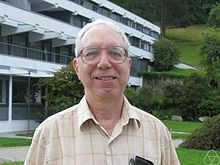William Cantor
William M. Kantor (* 1944 ) is an American mathematician who studies group theory and geometry.
Kantor studied at Brooklyn College with a bachelor's degree in 1964 and received his doctorate in 1968 from the University of Wisconsin under Peter Dembowski and Richard Bruck ( 2-transitive Symmetric Designs ). He was then at the University of Illinois in Chicago and from 1971 professor at the University of Oregon .
Kantor deals with finite geometries , group theoretical algorithms, combinatorics, coding theory and geometry. He has co-organized conferences at Oberwolfach on group theory and geometry and at Ohio State University in Columbus on group theory in computer science.
In 1998 he was invited speaker at the International Congress of Mathematicians in Berlin ( Simple groups in computational group theory ). He is a fellow of the American Mathematical Society .
At the end of the 19th century, S. Kantor (also MS Kantor) worked in Vienna, who worked in a similar field and after whom some movements are named (Möbius-Kantor configuration, Möbius-Kantor graph).
Fonts
- with Ákos Seress Black box classical groups , Memoirs of the American Mathematical Society 2001
- Editor with Lino Di Martino: Groups of Lie type and their geometries. Como 1993 , Cambridge University Press 1995
- Editor with Robert Liebler: Finite geometries, buildings, and related topics , Clarendon Press, Oxford 1990
- Editor with Larry Finkelstein: Groups and Computation , DIMACS Series in Discrete Mathematics and Theoretical Computer Science 11, AMS 1993
- Editor with Larry Finkelstein: Groups and Computation II , DIMACS Series in Discrete Mathematics and Theoretical Computer Science 28, AMS 1997
- Editor with Ákos Seress: Groups and Computation III , Proceedings of the International Conference at The Ohio State University, De Gruyter 2001
- with László Babai , Eugene Luks : Computational complexity and the classification of finite simple groups , Proceedings of the 24th Annual Symposium on Foundations of Computer Science (FOCS), 1983, pp. 162–171
Web links
Individual evidence
| personal data | |
|---|---|
| SURNAME | Cantor, William |
| ALTERNATIVE NAMES | Cantor, William M. |
| BRIEF DESCRIPTION | American mathematician |
| DATE OF BIRTH | 1944 |
